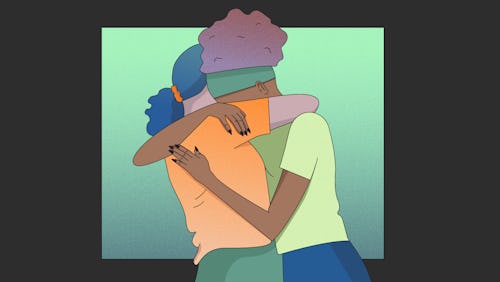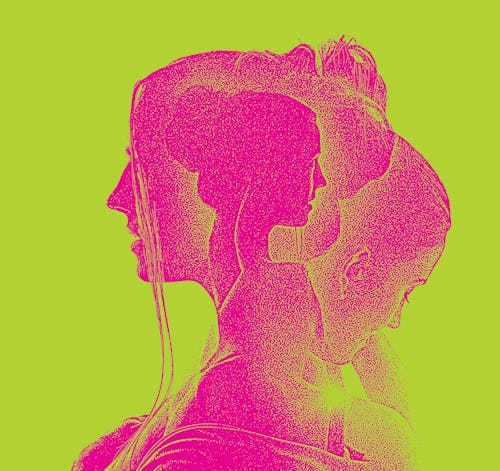
I don't think I had a full-fledged substance abuse problem until I officially came out. I lived in a small, southern city when I left my male partner for a woman. My ex-partner told everyone he knew that I had a “gay affair” and people talked everywhere I went. Once I was at a restaurant and a friend of my ex said loudly, "That's M's ex. They had sex with the whole women's roller derby team and he had to move to get away from them." I kept my cool for about four seconds and then took a shot. And another. And another. Rinse and repeat.
I had had a lot of queer relationships before that, but I was pretty quiet about them. Being publicly outed in a conservative suburb was traumatizing, and I started partying constantly. I used substances both to escape and to explore my new life. I didn’t know what it meant to be here and queer and I was definitely not used to it, so I used drinking and drugs as a buffer. Eventually — almost two years later — I realized that even though I had come out to everyone, I still wasn’t comfortable in my own skin. All the parties in the world weren’t helping, and it dawned on me that if I didn’t get sober I was going to end up as a very sad statistic.
It is well documented that queer and trans people experience substance misuse issues at higher rates than our cis-het counterparts. In fact, we are more than twice as likely to face addiction. That is a harsh reality. But what I have found is that when we, as queer people, enter recovery, we often recover more than sobriety. It was in the process of recovery that I fully embraced my gender nonconformity, and it was in recovery support groups that I learned the emotional skills I needed to have nurturing relationships.
For me and many queer folks that I know, coming into our full sexual and gender identities is a giant part of what it means to recover. I talked to experts about how queer people use the process of getting sober to joyfully embrace our identities.
It is well documented that queer and trans people experience substance misuse issues at higher rates than our cis-het counterparts.
To those outside of addiction recovery communities, it may seem like all the meetings and the coaches and the programs are just about “getting clean,” but the reality is more nuanced. “Recovery from substance abuse is about far more than giving up a thing,” says Dana Leigh Lyons, a sobriety coach and acupuncturist in Florida. “It's about getting honest and coming home to our truest, most whole selves. This encompasses our experience of gender and sexual identity.” In other words, getting sober is as much about getting clean with yourself about yourself as it is about kicking a drug.
It’s often not just the simple fact of sobriety that leads to personal discovery, though. It’s the process of recovery. “A healthy recovery process helps people to peel off the layers of protection that the person has built over the years,” says John M. O’Brien, a Maine-based psychologist and professor of psychology at the University of Augusta. “Recovery involves an increase in self-awareness and self-acceptance.”
To be clear, peeling off protective layers while you’re also trying to detox and also maybe grappling with your identity is not comfortable. “This [part of recovery] is often painful. And often glorious. In embracing the intensity of life and who we are, we get the uncut version,” Lyons says.

Embracing the intensity of sober self-awareness is what can lead us to personal revelation. “When we stop numbing pain and stop numbing parts of ourself, we also stop numbing the possibility for joy and even euphoria,” says Lyons. This really lands for me. While I have certainly experienced many kinds of gender dysphoria in my life, I don’t think I ever felt true gender euphoria until I was well into my recovery process. MDMA may bring a certain kind of bliss, but it doesn’t even come close to what it feels like to finally fall in love with your whole queer nonconforming self after being inculcated by the cis-heteropatriarchy into thinking you aren’t loveable.
Peeling off protective layers while you’re also trying to detox and also maybe grappling with your identity is not comfortable.
The sense of self-acceptance many queer people find in recovery doesn’t have to be flashy or glittery. There are as many ways to accept yourself as there are selves to accept. Lyons tells me that some of her clients develop a calm, steady sense of self-knowing as they get sober. Others are flamboyant. “There's tremendous surprise, relief, and joyous expectation that comes in getting clear and showing up as oneself -- including as a self that is continuously becoming,” Lyons says. I wholeheartedly agree. At this point in my personal process, I am excited by the idea that there is more of me to get to know.
The thing is that while recovery can lead to all kinds of personal epiphanies, the recovery process must take place in community. “Supportive community is huge -- even just one or two people, whether online or off,” says Lyons. O’Brien agrees and adds that reading the stories of other queer people who’ve dealt with addiction can be profoundly helpful. Not to mention inspiring. RuPaul famously credits his success to his sobriety. “I feel incredible,” Rupaul told Gay U.K. in 2014, when he compared quitting drugs to letting go of the limitations that kept him stuck by way of a cosmic metaphor. “To launch a rocket into space you need to use the fuselage but at some point you leave Earth’s atmosphere and you don’t need that fuselage anymore,” Rupaul said.
There's freedom in knowing, as a queer person, that you can embrace all the parts of yourself without the buffer of substances. “This is sobriety in the most expansive sense,” Lyons says. “It is a coming home to expression and truth.”







